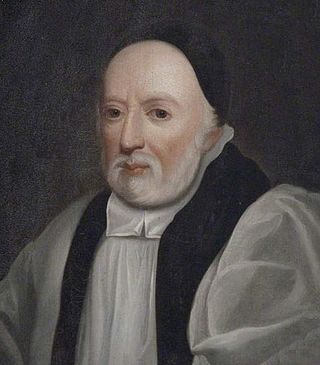Related Research Articles
John Oxenbridge was an English Nonconformist divine, who emigrated to New England.

The Great Ejection followed the Act of Uniformity 1662 in England. Several thousand Puritan ministers were forced out of their positions in the Church of England following the Restoration of Charles II. It was a consequence of the Savoy Conference of 1661.
Anthony Burges or Burgess was a Nonconformist English clergyman, a prolific preacher and writer.
William Bagshaw or Bagshall (1628–1702) was an English presbyterian and nonconformist minister, known as the "Apostle of the Peak".
William Ince (1825–1910) was a British theologian. He was Regius Professor of Divinity at Oxford, from 1878.

Simeon Ashe or Ash was an English nonconformist clergyman, a member of the Westminster Assembly and chaplain to the Parliamentary leader Edward Montagu, 2nd Earl of Manchester.
Thomas Horton D.D. was an English clergyman, Professor of Divinity at Gresham College in London, and President of Queens' College, Cambridge.

William Jenkyn (1613–1685) was an English clergyman, imprisoned during the Interregnum for his part in the 'Presbyterian plot' of Christopher Love, ejected minister in 1662, and imprisoned at the end of his life for nonconformity.
Henry Wilkinson (1610–1675) was an English clergyman, in the Commonwealth period a canon of Christ Church, Oxford, Lady Margaret Professor of Divinity, and member of the Westminster Assembly. Later he was a nonconformist preacher.

Robert Creighton or Crichton (1593–1672) was a Scottish royalist churchman who became Bishop of Bath and Wells.
Dr. Calybute Downing (1605–1643) was an English clergyman, a member of the Westminster Assembly. Also a civil lawyer, he is now remembered for political views, which moved from an absolutist position in the 1630s to a justification of resistance to authority by 1640, within a contractarian setting.
Nathaniel Hardy (1618–1670) was an English churchman, Dean of Rochester from 1660.

Nicholas Lockyer (1611–1685) was an English clergyman and Independent minister, a close supporter of Oliver Cromwell and Provost of Eton College, and later an ejected minister and nonconformist.
Edward Reyner (Rayner) (1600–c.1668) was an English nonconforming clergyman, known as a devotional writer.

Edward Denison the elder (1801–1854) was an English bishop of Salisbury.
John Geree was an English Puritan clergyman preacher, and author of several tracts engaging in theological and political issues of the day, who was silenced for nonconformism but later reinstated. His elder brother Stephen Geree (1594-1665), also a Puritan minister and author, maintained his ministry through the Commonwealth and Restoration in Surrey.

George Newton (1602–1681) was an English ejected nonconformist minister.
William Nicholas Darnell was an English cleric, academic and antiquarian.
George Saxby Penfold was a Church of England clergyman, Rector of several parishes and active as a visiting preacher. In 1825 the University of Oxford awarded him the degree of Doctor of Divinity. A pluralist, for much of his life Penfold held the living of more than one benefice at once.
Richard Watson was a Church of England clergyman, Royalist divine, controversialist, and poet.
References
- ↑ Foster, Joseph. Alumni Oxonienses: The Members of the University of Oxford, 1715-1886 and Alumni Oxonienses: The Members of the University of Oxford, 1500-1714. Oxford: Parker and Co., 1888-1892.
- ↑ "Bromhall, Andreas (CCEd Ordination ID 86165)". The Clergy of the Church of England Database 1540–1835 . Retrieved 28 October 2024.
- ↑ John Hutchins, Dorset, ii. 253
- ↑ John Walker, Sufferings of the Clergy, p. 322
- ↑ Church of England Parish Registers, 1538-1812. London, England: London Metropolitan Archive
- ↑ Church of England Parish Registers, 1538-1812. London, England: London Metropolitan Archives.
- . Dictionary of National Biography . London: Smith, Elder & Co. 1885–1900.
- Attribution
![]() This article incorporates text from a publication now in the public domain : "Bromhall, Andrew". Dictionary of National Biography . London: Smith, Elder & Co. 1885–1900.
This article incorporates text from a publication now in the public domain : "Bromhall, Andrew". Dictionary of National Biography . London: Smith, Elder & Co. 1885–1900.